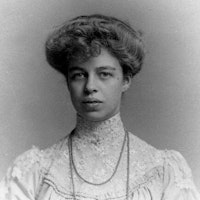Where, after all, do universal rights begin? In small places, close to home – so close and so small they cannot be seen on any maps of the world.
Where, after all, do universal rights begin? In small places, close to home—so close and so small they cannot be seen on any maps of the world.
Eleanor Roosevelt

Universal Rights
Theme: A Vision of America
Where, after all, do universal rights begin? In small places, close to home – so close and so small they cannot be seen on any maps of the world. Yet they are the world of the individual persons; the neighborhoods; the school or college; the factory, farm or office. Such are the places where every man, woman and child seeks equal justice, equal opportunity, equal dignity without discrimination. Unless their rights have meaning there, they have little meaning anywhere. Without concerned citizen action to uphold them close to home, we shall look in vain for progress in the larger world.
Anna Eleanor Roosevelt, born on October 11, 1884, and passing away on November 7, 1962, was a significant American political figure, diplomat, and activist. Her service as the First Lady of the United States from March 1933 to April 1945, alongside her husband President Franklin D. Roosevelt during his four terms in office, marked her as the longest-serving First Lady of the United States. Her tenure as First Lady was just the beginning of a long and impactful career in public service, showcasing her commitment to various social and political causes.
Following her role as First Lady, Roosevelt transitioned into a diplomatic position, serving as the United States Delegate to the United Nations General Assembly from 1945 to 1952. This role significantly contributed to her reputation as a dedicated advocate for human rights. Her work in promoting human rights on an international stage was groundbreaking, bringing attention to issues that were often overlooked, and working towards creating a world where human rights were recognized and protected.
Eleanor Roosevelt's legacy is marked by her dedication to human rights, her service to her country, and her continuous advocacy for the marginalized and oppressed. Her efforts in the realm of human rights were acknowledged by President Harry S. Truman, who honored her with the title "First Lady of the World." This title not only pays tribute to her achievements in the realm of human rights but also recognizes the lasting impact she had on both national and international platforms. Through her life’s work, Roosevelt set a lasting standard for public service and remains a notable figure in American history.
Speech to the United Nations delegates
Wilson, Andrew, editor. World Scriptureuniversal,declaration,human,rights. Universal Peace Federation, 2011, p. 981 [Eleanor Roosevelt].

Eleanor Roosevelt
Theme: A Vision of America

About This Eleanor Roosevelt Quotation [Commentary]
Eleanor Roosevelt’s words—“Where, after all, do universal rights begin? In small places, close to home”—draw attention to the everyday spaces where justice must take root. These “small places” are not metaphorical; they are specific: “the neighborhoods; the school or college; the factory, farm or office.” She emphasizes that these spaces, though too “small” to be seen “on any maps of the world,” are “the world of the individual persons.” The recognition of human dignity begins not in policy statements but in daily life. Rights are not meaningful if they are only promised from a distance—they must be experienced personally.
Roosevelt continues, “Unless their rights have meaning there, they have little meaning anywhere.” If equality is not present in the home, the workplace, or the community, then the larger promises of democracy remain unfulfilled. These small places are where “every man, woman and child seeks equal justice, equal opportunity, equal dignity without discrimination.” Her concern is not only legal but relational—how people treat one another in ordinary circumstances reveals whether rights are real. A vision of America, for Roosevelt, must be measured by how it honors dignity in these unspectacular but essential places.
She concludes with a call to involvement: “Without concerned citizen action to uphold them close to home, we shall look in vain for progress in the larger world.” Roosevelt does not separate moral values from civic responsibility. The defense of human rights, as she saw it, is not a distant effort—it is a local one. Her vision centers on the idea that change begins where people live, work, and study. It is in these overlooked places that justice either takes hold or does not.
Eleanor Roosevelt
Eleanor Roosevelt, former first lady of the United States and wife of Franklin Delano Roosevelt, was a human rights activist who, as an American delegate to the United Nations in 1948, played a central role in shaping the Universal Declaration of Human Rights.
The real challenge, she liked to tell United Nations delegates in later years, was one of ”actually living and working in our countries for freedom and justice for each human being.”
—Richard N. Gardner [Eleanor Roosevelt’s Legacy: Human Rights (Published: December 10, 1988 in the New York Times)].
“I have met and spoken with Jacqueline Kennedy in the spirit world, she is very much into the beauty of things and is very different from the person you knew when she was on earth. She was sometimes criticized by the world, as I was, but she has a noble mind. With a number of other first ladies and presidents, she and I are both still concerned about the nation [of America]. we had a role to play and a certain path to follow, and we continue on that path today by working through others on earth. It only stands to reason that whoever was a first lady would, in some way, shape, or form, come back from spirit to the earth plane to continue walking that path through other first ladies or leading ladies [luminaries]. It would not have to be the wife of a president, but any lady in a leading position with whom we found rapport. In the same way presidents come back to work with presidents or leaders on earth who have a significant role.”
—Burley, Philip, medium, and Dolores Proiette. Voices of Love from the Light: Conversations with 20 Great Souls in the Afterlife. Mastery Press, 2018.
Related Quotes
Copyright © 2017 – 2026 LuminaryQuotes.com About Us